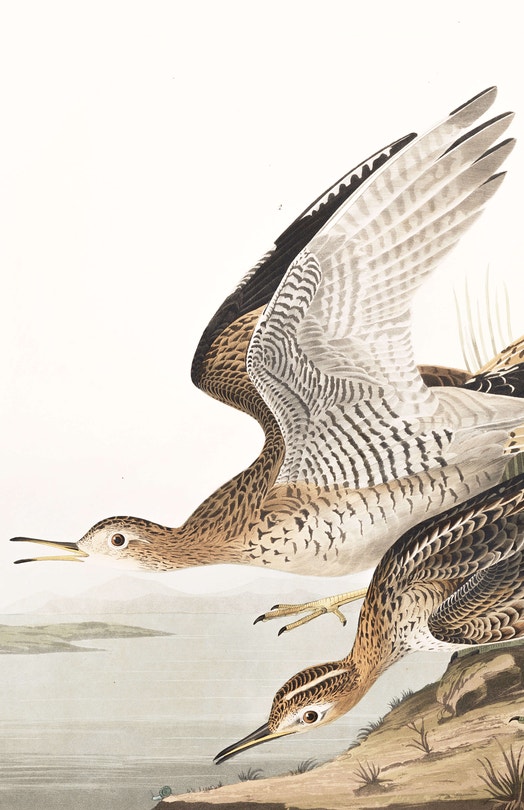July 12
I measure a horseshoe on the back side twenty-two inches by eleven.
The low sand-downs between East Harbor head and sea are thinly covered with beach-grass, seaside goldenrod, and beach pea.
Fog wets your beard till twelve o’clock.
Long slender seaside plantain leaf at East Harbor head. Solanum (with white flowers) nigrum in marsh. Spergularia rubra var. marina.
Great many little shells by edge of marsh - Auricula bidentata and Succinea avara.
Great variety of beetles, dor-bugs, etc., on beach. I have one green shining one. Also butterflies over bank.
I was surprised to see great spider-holes in pure sand and gravel, with a firm edge, where man could not make a hole without the sand sliding in, —in tunnel form.
"In Massachusetts, and to the eastward of that state,
this species is best known by the name of 'Upland Plover,'”
The upland plover begins with a quivering note somewhat like a tree-toad and ends with a long, clear, somewhat plaintive or melodious hawk-like scream. I never heard this very near to me, and when I asked the inhabitants about it they did not know what I meant.* It hovers on quivering wing, and alights by a steep dive.
My paper so damp in this house I can’t press flowers without mildew, nor dry my towel for a week.
H. D. Thoreau, Journal, July 12, 1855
*Frank Forester, in “Manual for Young Sportsmen,” 1856, page 308, says,
“This bird has a soft plaintive call or whistle of two notes, which have something of a ventriloquial character and possess this peculiarity, that when uttered close to the ear, they appear to come from a distance, and when the bird is really two or three fields distant, sound as if near at hand.”
Upland ploever See Augusst (?), 1850 ("As I was stalking over the surface of this planet in the dark to-night, I started a plover resting on the ground and heard him go off with whistling wings."); June 15, 1860 ("I heard the familiar willet note of the upland plover and looking up, saw one standing erect — like a large tell tale, or chicken with its head stretched up — on the rail fence. After a while it flew off southwest and l , then wheeled and went a little higher down the river . Of pigeon size, but quick quivering wings. Finally rose higher and flew more or less zigzag, as if uncertain where it would alight, and at last, when almost out of sight it pitched down into a field near Cyrus Hubbard's. It was the same note I heard so well on Cape Cod in July, '55")
Thoreau's Upland Plover is the Upland Sandpiper (Bartramia longicauda).His Peetweet is the Spotted Sandpiper (Actitis macularia). He also observed the Lesser Golden-Plover (Pluvialis dominica ) and Piping Plover (Charadrius melodus) See Thoreau's Birds
July 12. See A Book of the Seasons, by Henry Thoreau, July 12
The upland plover
hovers on quivering wing –
alights by steep dive.
A Book of the Seasons, by Henry Thoreau
"A book, each page written in its own season,
out-of-doors, in its own locality.”
~edited, assembled and rewritten by zphx © 2009-2021





No comments:
Post a Comment